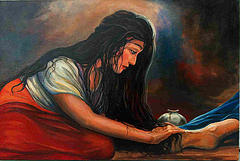 |
| Crucifixion by Michaelangelo |
Maundy Thursday is so called because we hear Christ's new commandment read.
A new command I give you: Love one another. As I have loved you, so you ought to love one another. By this everyone will know that you are my disciples, if you love one another. ~ John 13.34-35Mandatum is the Latin word for commandment, hence Maundy Thursday. We celebrate the foot washing, some places even giving opportunity to come forward and have your own feet washed. (If you've never experienced this it is a powerful and humbling moment. The first time I had this done I was in college and was moved to tears as the pastor knelt and washed my icky, fungus-growing feet.) It is also, however, the day we celebrate Jesus' last Passover meal with his friends. Some places celebrate a Seder meal on Maundy Thursday, while others simply place a special emphasis on Holy Communion. Whatever the tradition of each particular place, Manudy Thursday is an important step in the journey that is Holy Week.
Good Friday is the day the church remembers and yes, celebrates, Christ's death and resurrection. It is the day we journey into the deepest, darkest places of humanity: into deceit, lies, violence, terror, and despair. It is the day we journey, as Bishop Michael Burk said once, "into the place where we are most ourselves." When Bishop Burk said this, he was talking about Jesus in the Garden of Gethsemane, the place where all his fears, hopes, dreams, and aspirations about life were brought into the light of day. Except on this Good Friday we find Jesus in the garden at night - in the dark. His fears of what lies ahead are brought into the light of the darkest night and he realizes he cannot escape what is waiting. That what has come to pass is the place where everyone is most themselves - and themselves is not pretty.
So Christ goes. Like a lamb uncomplaining forth, he goes into the darkest places of humanity with us. And it is there that we ponder his sacrifice. It is there that we appreciate what he has done. It is there that we love the savior of the world. It is there, on the cross, that we find ourselves mostly ourselves - and then we wait.
We know that Easter is coming, that bright and glorious morning. The deepest, darkest night does not last forever, but rises new with the sun, but rises new with the Son. And then we come to know who we really are. As Christ is made new and brought from the darkness to the light, so we too, joined to Christ through baptism, are brought from our darkness into the light. In this light we live, in this light we love, in this light we thrive.
I pray that your Holy Week journeys might be filled with the awesome wonder of the mystery that is the cross, the mystery that is new life in Christ, the mystery that is the journey of the disciple.



